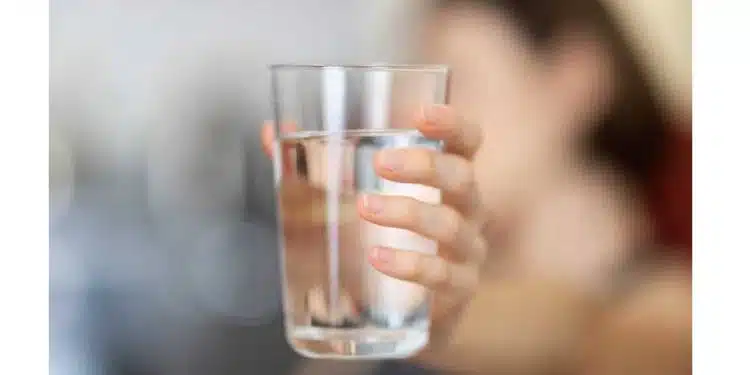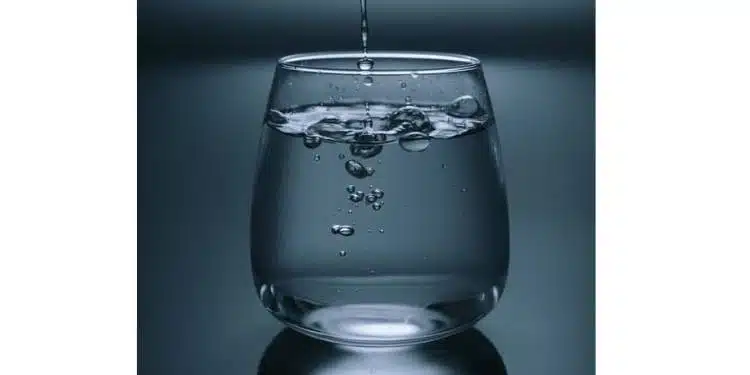by Fayne Frey, MD Board Certified Dermatologist
On a regular basis, I hear ″experts″ tout the benefits of drinking water, and lots of it. I agree that water is a good thing and that it’s very important to keep ourselves hydrated. Our bodies are about 60 percent water, and we lose water throughout the day, mostly through urine and sweat. We need to replace the fluids we lose. But where did this concrete number of eight glasses per day come from?
Where Did the Recommendation for 8 Glasses of Water/Day Come From?
I am not sure who came up with this specific amount. The Centers for Disease Control and Prevention (CDC) does not tell us specifically how much water we should drink; they provide only basic recommendations. And in their guidelines, they consider all the water we consume, including that which we get from food in the course of a day. Did you know the average American gets approximately 20% of their daily water intake from food? That percentage is even higher if you consume lots of fruits and vegetables every day.
Don’t Stress – Do the Best You Can When it Comes to Drinking Water
Some of the patients I see in my office appear stressed about trying to drink the eight glasses every day. Hard as they try, they tell me, they are unable to take in that much. I let them know it’s OK. Eight glasses are commonly recommended, but most of the time, you can let thirst be your guide as to how much you need. In truth, a healthy person generally does NOT need eight glasses of water per day. No research actually exists to support this recommendation.
Equally important to note is that while staying hydrated is good for both your health and appearance, too much water can be dangerous. Too much of anything is usually not good, which is why I tend to preach moderation in general.

Yes, We All Need Water, But How Much?
With all the talk about staying hydrated all over the media, you likely are aware that water keeps virtually every system in our bodies functioning properly. It normalizes blood pressure, protects organs and tissues, and helps regulate our body temperature. Water also aids in digestion, maintains electrolyte balance, and is necessary for almost every cellular reaction in the body.
However, there are a wide variety of opinions on just how much to drink. Some people go with the common eight 8oz glasses/day rule, the equivalent of half a gallon daily. Others believe you need to sip constantly on water all day long, even when you’re not thirsty. As with most things, it depends on the person and the situation.
Recommendations for a healthy water intake vary by age, ethnicity, level of activity, baseline health, pregnancy, altitude, and even ambient temperature. No one quantity is the “right” amount for everyone. Some people need more than eight glasses per day, others can do with less.
How Much Is Too Much?
Water intoxication or water poisoning is caused by an abnormal electrolyte balance due to excessive water intake. Hyponatremia, or low blood sodium blood levels, can result when your body can’t get rid of water through your kidneys faster than you take it in. Symptoms of this condition include nausea, headache, confusion, and in the most extreme cases, even death. When consumed in abundance, water can be considered poisonous.
Here’s an extreme example. In June 2020, a sad story about the death of an 11-year-old boy spread in the media. Because of recurring bedwetting, his parents allegedly forced the young boy to drink 64 ounces of water (less than a 2-liter bottle) a day. It was not clear how fast they made him drink the water or even if that exact amount was accurate but what we do know is that the boy died from water intoxication.
The Bottom Line
People like concrete numbers; it’s easy to set a tangible goal with a specific recommendation. However, the common advice to drink eight glasses per day is not based on studies: it’s an arbitrary number. The human body is amazing and has an incredible way of letting you know when you need to drink more. There will likely be times in your life when you need to hydrate more due to health issues or circumstances beyond your control, but in general, I recommend you eat a nutritious diet that includes fruits and vegetables and let thirst be your guide.
About the Author, Fayne Frey, M.D.
 Fayne Frey, M.D., is a board-certified clinical and surgical dermatologist practicing in West Nyack, New York, where she specializes in the diagnosis and treatment of skin cancer. She is a nationally recognized expert in the effectiveness and formulation of over-the-counter skincare products, and, as a speaker, has captivated audiences with her wry observations regarding the skincare industry. She has consulted for numerous media outlets, including NBC, USA Today, and, the Huffington Post, and has shared her expertise on both cable and major TV outlets. Dr. Frey is the Founder of FryFace.com, an educational skincare information and product selection service website that clarifies and simplifies the overwhelming choice of effective, safe, and affordable products encountered in the skincare aisles. Dr. Frey is a fellow of both the American Academy of Dermatology and the American Society for Dermatologic Surgery.
Fayne Frey, M.D., is a board-certified clinical and surgical dermatologist practicing in West Nyack, New York, where she specializes in the diagnosis and treatment of skin cancer. She is a nationally recognized expert in the effectiveness and formulation of over-the-counter skincare products, and, as a speaker, has captivated audiences with her wry observations regarding the skincare industry. She has consulted for numerous media outlets, including NBC, USA Today, and, the Huffington Post, and has shared her expertise on both cable and major TV outlets. Dr. Frey is the Founder of FryFace.com, an educational skincare information and product selection service website that clarifies and simplifies the overwhelming choice of effective, safe, and affordable products encountered in the skincare aisles. Dr. Frey is a fellow of both the American Academy of Dermatology and the American Society for Dermatologic Surgery.
Additional Notes About Hydration (From the Publisher)
We often receive questions about IV drip hydration when we discuss water intake. The ability to receive IV hydration and nutrition without an order from your personal physician is a relatively new trend. Just as it was once impossible to obtain MRIs, ultrasounds, and genetic testing without a specific medical reason and a prescription from your doctor, IV drips are now available to all. If considering IV hydration, we urge you to use a location with trained medical professionals on staff.
Most healthy people are able to drink enough water to hydrate themselves adequately. However, IV hydration might be a good option if you find yourself in a situation where you need extra hydration, especially in specific scenarios like after strenuous physical activity or illness. For example, the mobile IV in Austin might provide a targeted and efficient way to rehydrate and replenish your body’s essential fluids and nutrients.
If you are not familiar with IV hydration, also called intravenous hydration, it is a medical procedure involving the delivery of fluids directly into a person’s veins through an intravenous (IV) line. It is commonly used to treat dehydration and deliver essential nutrients, electrolytes, and medications into the bloodstream. Keep in mind, how beneficial these treatments will be for you depends on your specific situation and current health status.
Lately, IV hydration has gained popularity for hangover relief, as it can help rehydrate the body and alleviate some hangover symptoms. Here is where we remind you that prevention, i.e., moderate alcohol consumption and proper hydration, is the key to avoiding hangovers in the first place!
Neither the article from Dr. Frey nor the note from the publisher are intended as medical advice. Please visit your physician with your concerns and questions.










